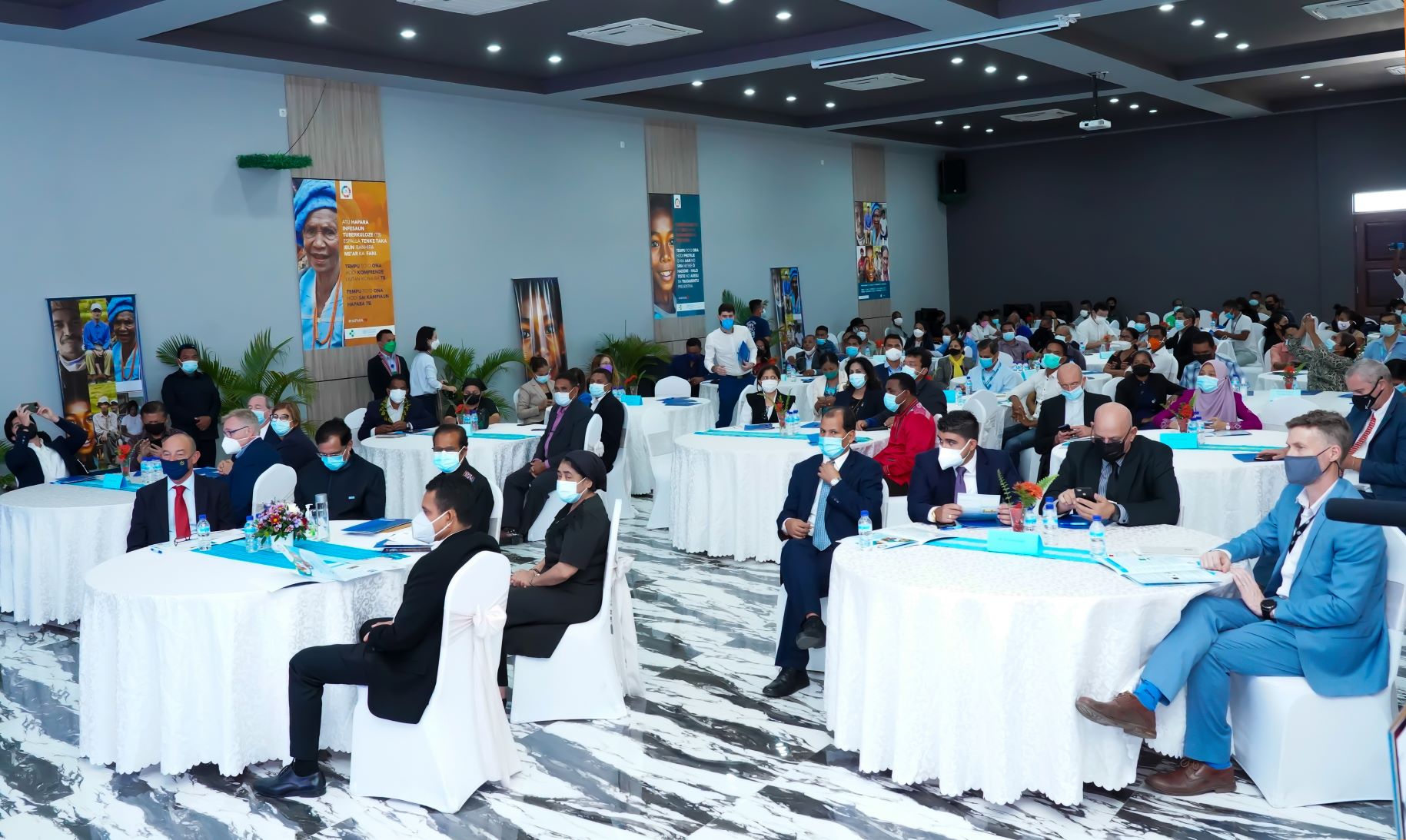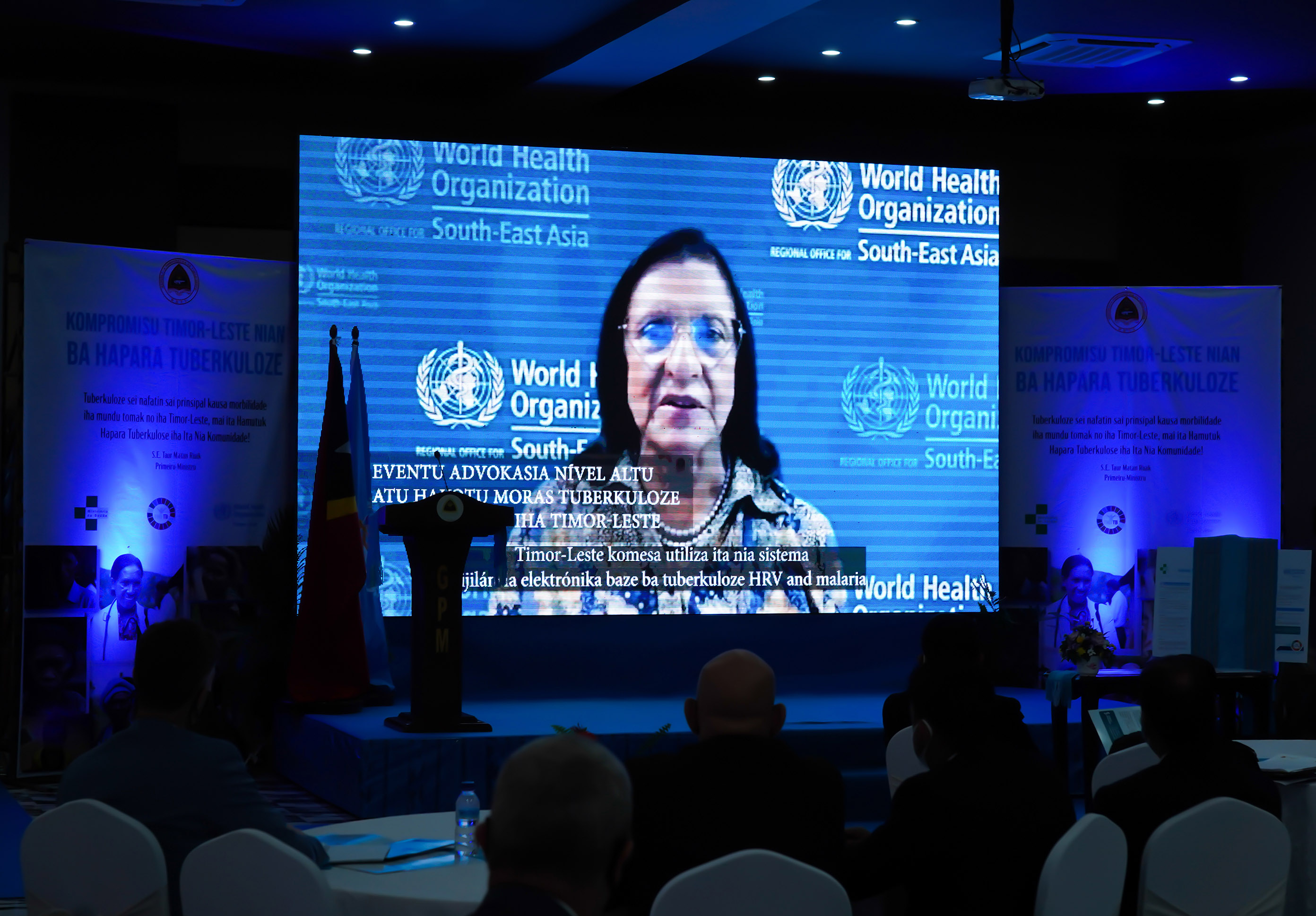In a first-of-its-kind initiative against TB, the Ministry of Health (MoH) held a pledge signing ceremony, with support from WHO Country Office. HE Prime Minister of Timor Leste, General Taur Matan Ruak, on this day, signed the pledge that envisions comprehensive support and actions to "End TB" in Timor-Leste. The Prime Minister also launched the "National Plan for Accelerated Actions for Ending TB by 2025" at the same event.
Apart from His Excellency General Taur Matan Ruak, Hon’ble Prime Minister, this high-level pledge signing event for ending TB was attended by HE Dra Odete Maria Freitas Belo, Hon’ble Health Minister, HE Miguel Carvalho, Hon’ble Minister of Estatal; Dr Arvind Mathur, WHO Country Representative, Mr Hemanshu Roy Trivedi, UN Resident Coordinator and Dr Odette Da Silva Viegas, Director General of Health Services with Senior Officials from the Ministry of Health and other Ministries. The event was graced by HE Ambassadors of the Resident Embassies and members of Diplomatic Corps; Country Representatives of UN and International agencies; Members of the Civil Society and Non-Government Organizations; National and International Development Partners.

© WHO Timor-Leste

© WHO Timor-Leste
Tuberculosis (TB), one of the deadliest infectious diseases, affects about 508 people in every 100,000 inhabitants in Timor-Leste, representing the second-highest incidence rate in the Southeast Asian region and one of the highest in the world.
"We are not satisfied with these figures, nor are we resigned to the results obtained in recent years. It is in this sense that today, as the Head of Government, we renew our unbreakable commitment to "End Tuberculosis," said HE Prime Minister, Taur Matan Ruak on 30 September 2021 at one of its kind events designed to give an impetus to the fight and end TB by 2025 in the country.

© WHO Timor-Leste

© WHO Timor-Leste
While the burden of TB in the island country is not unknown or new, it is complex. Timor-Leste has the highest disease burden in the region and the world. Malnutrition and smoking are the top two known drivers of the TB epidemic, both of which have recorded very high prevalence rates for years together. It is estimated that there are 18 new cases of TB every day, on average. Since the beginning of the pandemic, TB services have experienced a further setback.
A recent modelling estimate suggests that the disruption caused by the pandemic could lead to an increase in cumulative cases by about 2% and cumulative deaths by about 6%. As a result, the hard-won gains made over two decades are under threat.
However, the solution to the problem of TB exists and has for long; the disease is preventable, treatable, and curable. The National Programme Manager, TB, Sr Constantino Lopes, explains, "Notwithstanding the COVID-19 pandemic, we plan to continue the outreach activity, i.e., to screen individuals and households. We are continuing with community outreach, sensitizing them so that we improve the screening rates."

© WHO Timor-Leste
During the recently held country dialogues with community representatives, recommendations were made for intensified TB control efforts through better community response and engagement. These recommendations are now among the guiding tools in the collective fight against TB.
Leandro Soares story of contracting TB, undergoing treatment bears testimony to how lives are affected and how they can be saved too from the disease. "I was diagnosed with TB during the pandemic, but I am under medical care and continuing the treatment," he says.
"I do my best to persuade friends and families to visit the nearest healthcare centre seek medical help when they suspect they have TB. I also explain to them the symptoms and what to look out for," says Mr Soares.
Investing in the fight against Tuberculosis and other diseases with a high risk of contagion is not just an expense but a wise decision by any government that wants its people and its country to succeed.
As HE PM General Ruak, signing the pledge, said “Ending Tuberculosis, a highly contagious, disabling and sometimes fatal disease, is not only an objective defined in the National Health Plan or in the Programme of the 8th Constitutional Government; it is a public health imperative and a constitutional duty undertaken towards our citizens, who wish to see the right to a healthy life become a reality"
WHO Representative to Timor-Leste, Dr Arvind Mathur in his remarks said “Investing in TB makes huge economic sense with a return of 43 USD against 1 USD” and so it’s prudent for me to advocate for higher allocation of domestic resources. He further reaffirmed that as a reliable and trusted partner, WHO is committed to extending the most scientific and actionable technical assistance and partner with all stakeholders in supporting the Ministry of Health and people of Timor-Leste in realizing their vision of Ending TB”.

© WHO Timor-Leste
For more details contact:
Ms Elizabeth Hasan
Communication Officer
WHO Timor Leste






